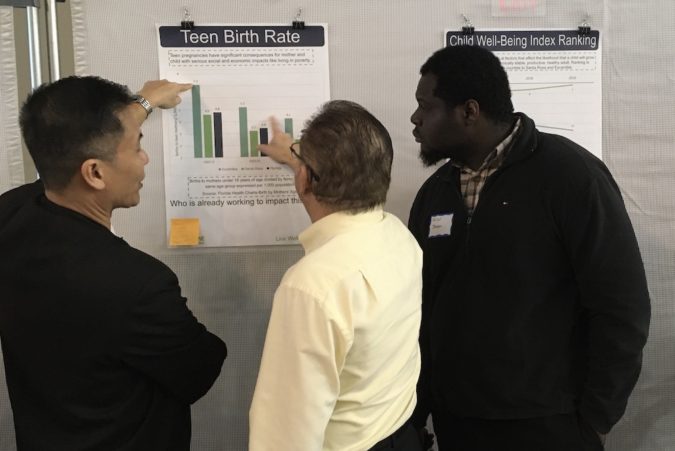
By Jeremy Morrison, Inweekly
The meeting was mostly about community health. But it was actually about a lot more—almost everything else.
“We have to look at this holistically, this is not just a health issue,†explained Dr. Denise Seabert, dean of the Usha Kundu, MD College of Health at the University of West Florida.
Speaking to a couple of hundred attendees at Achieve Healthy EscaRosa’s kickoff community health forum on Thursday, Dr. Seabert talked about how the local area’s “needs are great,†but also about how the community is “resource-rich†and how we “need to all work together.†The forum aimed to lay out so-called “social determinants to health†and explore avenues of improving the area’s health-scape.
Later, standing outside the UWF Conference Center meeting hall, Dr. Seabert said that she was encouraged by the turnout. She explained that this week’s forum wasn’t meant to provide answers, but rather to raise relevant questions and get “buy-in†from a broad spectrum of community organizations that might play a part in a conversation about improving a community’s health prospects.
“Saying, ‘ok, we’re ready to move on this,’†Seabert said.
Moving forward, this collective of organizations will work to improve social conditions that impact community health. Such social conditions —education, environment, economics and so forth — were laid out in graphs and charts and data bullet points for attendees at Thursday’s forum to study.
UWF President Martha Saunders summed up this concept of social determinants impacting health with a nod towards Maslow’s Hierarchy, an ordering of basic needs like “love†and “safety†and “esteem.â€
“If you haven’t handled things on the low end,†Saunders said, “then you’re not likely to thrive and make it to the high end.â€
Shawn Salamida, vice president of Baptist Health Care and president of behavioral health services at Lakeview Center, illustrated this with a pie graph, which indicated that issues directly pertaining to healthcare only played about a 10 percent role in a community’s actual overall health. Other factors that contribute include education rates, access to healthy food and affordable housing.
“The social determinants of health can impact between 40 and 90 percent of patient outcomes,†Salamida said.
The collective theme of this initial convening of area organizations searching for ways to improve community health was that the various parts of the community and stratus of society need to work together in order to realize improvements.
That sentiment was perhaps best expressed by Rev. Lonnie Wesley, III, pastor of Greater Little Rock Baptist Church, during his opening remarks at the forum: “No one will be able to stand up when their knee is on someone else.â€



